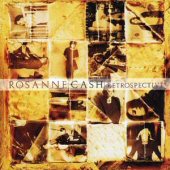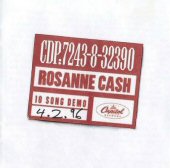- ROSANNE CASH – RETROSPECTIVE (Columbia)(1995)
- ROSANNE CASH – 10 SONG DEMO (Capitol)(1996)
Like her father, Rosanne Cash has followed a path that into areas foreign to most of the country music mainstream.
 Retrospective compliments Cash’s previous collection, Hits: 1979 -1989, offering an excellent overview without duplicating tracks included on the previous package. While her initial success was within the country vein, each successive release moved further away from any sort of Nashville formula. Cash’s final albums for Columbia, Interiors and The Wheel, marked a radical abandonment of the status quo. For purists irked by her decidedly feminist slant these albums nailed the lid shut on any chance of long-term country stardom. Both discs document the dissolution of her marriage to singer Rodney Crowell. Always an eloquent voice when dealing with affairs of the heart, these albums easily surpassed previous efforts. Songs such as What We Really Want and On the Surface (her final #1) deal with horrid issues with a matter-of-fact approach. From here on in she would be labeled a “women’s writer” rather than country. With a handful of tracks recorded specifically for the collection, Retrospective offers a fine overview of a first rate artist often misunderstood.
Retrospective compliments Cash’s previous collection, Hits: 1979 -1989, offering an excellent overview without duplicating tracks included on the previous package. While her initial success was within the country vein, each successive release moved further away from any sort of Nashville formula. Cash’s final albums for Columbia, Interiors and The Wheel, marked a radical abandonment of the status quo. For purists irked by her decidedly feminist slant these albums nailed the lid shut on any chance of long-term country stardom. Both discs document the dissolution of her marriage to singer Rodney Crowell. Always an eloquent voice when dealing with affairs of the heart, these albums easily surpassed previous efforts. Songs such as What We Really Want and On the Surface (her final #1) deal with horrid issues with a matter-of-fact approach. From here on in she would be labeled a “women’s writer” rather than country. With a handful of tracks recorded specifically for the collection, Retrospective offers a fine overview of a first rate artist often misunderstood.
 >Cash’s debut for Capitol Records, 10 song demo (actually 11 songs – the original title stuck) continues the string of excellent releases. Initially recorded as pre-production demos for a fully produced album, the label proposed the tapes be released as is and Cash agreed. Performances are limited to new husband/producer John Leventhal and Cash herself. The songs suit the sparse arrangements perfectly. Anything more would have approached overkill. Thematically the introspective journey is continued. While Cash appears to follow a number of philosophys, even when new age ideology is espoused, she counts the cost of living outside God’s will. Price of Temptation speaks of the cost of betrayal. The Summer I Read Collette relates her discovery of the French author, an obvious influence.
>Cash’s debut for Capitol Records, 10 song demo (actually 11 songs – the original title stuck) continues the string of excellent releases. Initially recorded as pre-production demos for a fully produced album, the label proposed the tapes be released as is and Cash agreed. Performances are limited to new husband/producer John Leventhal and Cash herself. The songs suit the sparse arrangements perfectly. Anything more would have approached overkill. Thematically the introspective journey is continued. While Cash appears to follow a number of philosophys, even when new age ideology is espoused, she counts the cost of living outside God’s will. Price of Temptation speaks of the cost of betrayal. The Summer I Read Collette relates her discovery of the French author, an obvious influence.
Sharing an approach similar to younger singers like P.J. Harvey and Liz Phair, Cash manages to convey the same sentiments without resorting to over the top statements, be it lyrical or musical. It’s a more mature, spiritual approach that comes across as a grown up version of the above mentioned artists. There is acceptance of loss, celebration of what remains, and a sense of calm throughout. An honest depiction of “the inner richness of women’s lives” her music is universal.
